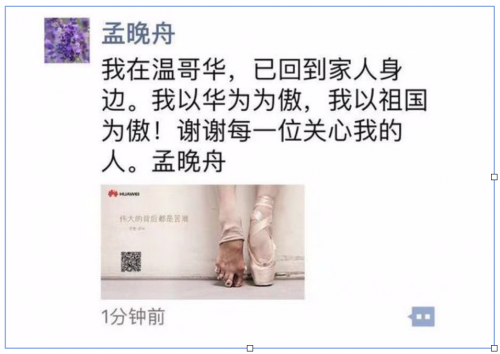Headlines and Hashtags
Internal Ren Zhengfei Speech Goes Viral
Among the top media stories in China this week, the Central Propaganda Department has created a new committee to make assessments of online games to determine whether they are harmful to society. The Online Gaming Ethics Committee has reportedly already made its first assessment of online gaming products, resulting in notices regarding 11 games for which changes are required to “eliminate moral risks” (消除道德风险), while approval was withheld for another 9 games. So far, however, there is little transparency about the group or how it reaches its decisions.
But of course one of the biggest stories in the Chinese media this past week was the release on bail of Huawei CFO Meng Wanzhou. Meng’s WeChat post shortly after her release was shared widely across social media. The day after her release, one of the most popular posts on social media was the text of an internal Huawei speech made back in September by Meng’s father, Huawei founder Ren Zhengfei, in which he spoke about the challenges facing Huawei in the West as a matter of a gap in understanding of values.
___________________
THIS WEEK IN CHINA’S MEDIA
December 8-14, 2018
➢ Huawei CFO Meng Wanzhou is granted bail, her father’s speech on dealing with the West is shared on social media
➢ Freezing Point articles on direct broadcasting to rural classrooms sparks debate about inequality
➢ China forms Online Gaming Ethics Committee led by Central Propaganda Department
➢ Public Security Bureau goes public about prosecution of extortion and blackmail by social media-based “Internet water armies”
[1] Huawei CFO Meng Wanzhou is granted bail, her father’s speech on dealing with the West is shared on social media
On December 11, 2018, Meng Wanzhou (孟晚舟), CFO of Huawei and daughter of the company’s founder, Ren Zhengfei (任正非), was granted bail by the court in Vancouver. That evening, Meng made a post through WeChat thanking all who had supported her and voicing her pride in the “mother country.” Her post became a focus of media coverage in China.

On the night of December 12, an internal speech delivered back in September by Ren Zhengfei called “Finding the Keys to Solving the World’s Problems in the Fruits of World Civilization” (从人类文明的结晶中,找到解决世界问题的钥匙), in which Ren repeatedly raised the problems facing Huawei in the West, was shared widely on social media. In the speech, Ren said China still lacks a deep understanding of the Western world, its value systems and its social psychology. Under the current situation, in which the discourse power and values of the West are dominant, said Ren, China can only understand Western values by seeing things from a Western perspective, and can only engage in dialogue on the basis of Western ways of thinking.
Understanding Western values, said Ren, was key to resolving the problems Huawei faced in the West.

“If we differ from the West in our values, how can we enter the West?” Ren asked in his speech. “They will tend to believe that we are attacking them, and they will build their walls even thicker and even higher, and our problems will be even greater.”
“Over the past few years, we have used Chinese ways of thinking to understand the world system, and to make guesses about the intentions of the West.”
Key Sources:
Netease (网易): 孟晚舟发朋友圈:以华为为傲,以祖国为傲
WeChat public account “People’s Daily” (人民日报): 刚刚,孟晚舟发了朋友圈:我以祖国为傲!
TMT Post (钛媒体): 任正非:华为要把5G做得更好,还要充分认识西方价值观 | CEO说
[2] Freezing Point articles on direct broadcasting to rural classrooms sparks debate about inequality
On December 12, the Freezing Point (冰点) supplement of China Youth Daily newspaper published an article called “This Screen Could Change Your Destiny” (这块屏幕可能改变命运), which reported that high schools in 248 poorer areas in China were taking classes and tests along with the famous Chengdu Number 7 High School via direct broadcasting (网络直播) and were experiencing much higher marks, with some of the schools in poorer areas even producing top-level provincial testers, or zhuangyuan (状元). In the past 16 years, Chengdu Number 7 High School has matriculated 72 thousand students, of which the vast majority have successfully tested into undergraduate programs and 88 have tested into China’s top two schools, Tsinghua University and Peking University.
The Freezing Point segment was meant to be a positive story about efforts to fight poverty, but for many it underlined instead the deep opportunity divide between China’s countryside and urban areas. Some also voiced the view online that it was disingenuous to talk about role of direct broadcasting as a form of instruction without addressing the prejudicial admissions policies of Tsinghua, Peking University and other elite schools.
Still others felt that the report was little more than a soft advertisement for East Edu, the for-profit educational services company operating the direct broadcasting services, which was founded in 2002 in cooperation with Chengdu Number 7 High School.
Key Sources:
China Youth Daily (中国青年报): 教育的水平线
WeChat public account “Freezing Point Weekly” (冰点周刊): 这块屏幕可能改变命运
WeChat public account “Vista Magazine” (看天下微杂志): 厉害了!直播不光能出网红,还能产状元!
Tencent (腾讯网): 不相信“一块屏幕改变命运”?这或许是一种“五环内”的偏见丨今日话题
InTouch Today (今日话题): “一块屏幕改变命运”,直播教学真有那么神?
Economic View APP (中新经纬客户端): 这块“可能改变命运的屏幕”背后:上市公司在布局
Luming Finance (鹿鸣财经): 这块屏幕可能无法改变命运,但却能造就亿万富豪夫妻
The Beijing News Online (新京报网): 别苛责“那块屏幕”了,它为贫寒子弟打开一扇窗还不够?
WeChat public account “No 4 QiYang Road” (启阳路4号): “这块屏幕可能改变命运”背后:行贿、挪用资金、股权冻结
STCN (证券时报网): “这块屏幕可能改变命运”刷屏,丁磊要捐1亿!这些公司正在布局
[3] China forms Online Gaming Ethics Committee led by Central Propaganda Department
On December 7, the official People’s Daily newspaper announced the formation in Beijing of the Online Gaming Ethics Committee, a new body under the Central Propaganda Department charged with making “moral assessments” (道德评议) of online games that are deemed to have a potential or actual negative impact socially, and with making recommendations to regulatory bodies concerning online games. According to state media reports, the committee will comprise representatives from Party and government agencies as well as from universities, “specialised organisations” (专业机构), news media and professional associations.
Shortly after being established, media said, the Online Gaming Ethics Committee had made its first assessment of online gaming products, which had resulted in notices to companies regarding 11 games that required alterations to “eliminate moral risks” (消除道德风险). Additionally, approval for 9 other games was withheld upon recommendation by the new body.
The Legal Daily quoted Zhu Wei (朱巍) , deputy director of the Communications Law Centre at Beijing University of Political Science and Law, as saying: “Right now the Online Gaming Ethics Committee is making determinations on ethical risk (道德风险), replacing a system of ‘hard supervision’ (强监管) with a system of ‘soft supervision’ (软监管), [making procedures] rather more flexible and more active.”
Zhu Wei also said that the assessment standards and work procedures of the Online Gaming Ethics Committee were not yet transparent, and over the longer term the rules would have to become normal procedures in compliance with Administrative Licensing Law. The China Culture Daily reported that “moral jurisdictional authority” (道德审查权) in the online gaming industry was a newly emerging authority and would need to be open and transparent, operating within the regulatory framework (在制度下运行). Furthermore, said the publication, the members of the Committee and the standards of assessment must be made public and be subjected to supervision.
Key Sources:
People’s Daily (人民日报): 网络游戏道德委员会成立并开展作品评议
Legal Daily (法制日报): 网络游戏道德委员会成立引关注专家分析 道德评议能否终结网游市场乱象
China Culture Daily (中国文化报): 网游有“德”需制度随行
[4] Public Security Bureau goes public about prosecution of extortion and blackmail by social media-based “Internet water armies”
China’s Public Security Bureau revealed its recent activities in regards to the investigation of cases of extortion and blackmail (敲诈勒索) perpetrated by self-media accounts, or zimeiti (自媒体). Information was reported by Guangming Daily, the Economic Daily and other official state media. According to these media reports, the Public Security Bureau “broke” (侦破) 28 cases in 2018 involving so-called “Internet water armies,” or wangluo shuijun (网络水军), referring to teams of online posters paid to support or attack in line with certain commercial or other agendas. The police made 67 related arrests, shut down 31 websites, and closed the accounts of around 1,100 “Big V” social media account holders that it alleged had been involved in the extortion and blackmail of around 80 companies and institutions.
Official state media reports said some “Internet water armies” had engaged in their activities under the banner of “supervision by public opinion” (舆论监督) — a term sometimes synonymous with investigative reporting — and “social supervision” (社会监督), using Weibo, WeChat and other social media platforms to blackmail other parties and force them into making hush payments or engaging in business deals.
Key Sources:
Guangming Daily (光明日报): 公安机关今年侦破“网络水军”违法犯罪案件28起 关闭各类网络大V账号1100余个 浇灭利用自媒体敲诈勒索的气焰
Economic Daily (经济日报): 公安部:重拳打击自媒体违法犯罪
Xinhua Daily Telegraph (新华每日电讯): 公安机关重拳打击“网络水军”违法犯罪 关闭“大V”账号千余个
The Beijing News Online (新京报网): 警方严打自媒体“网络水军”犯罪 关闭大V账号千余个






















